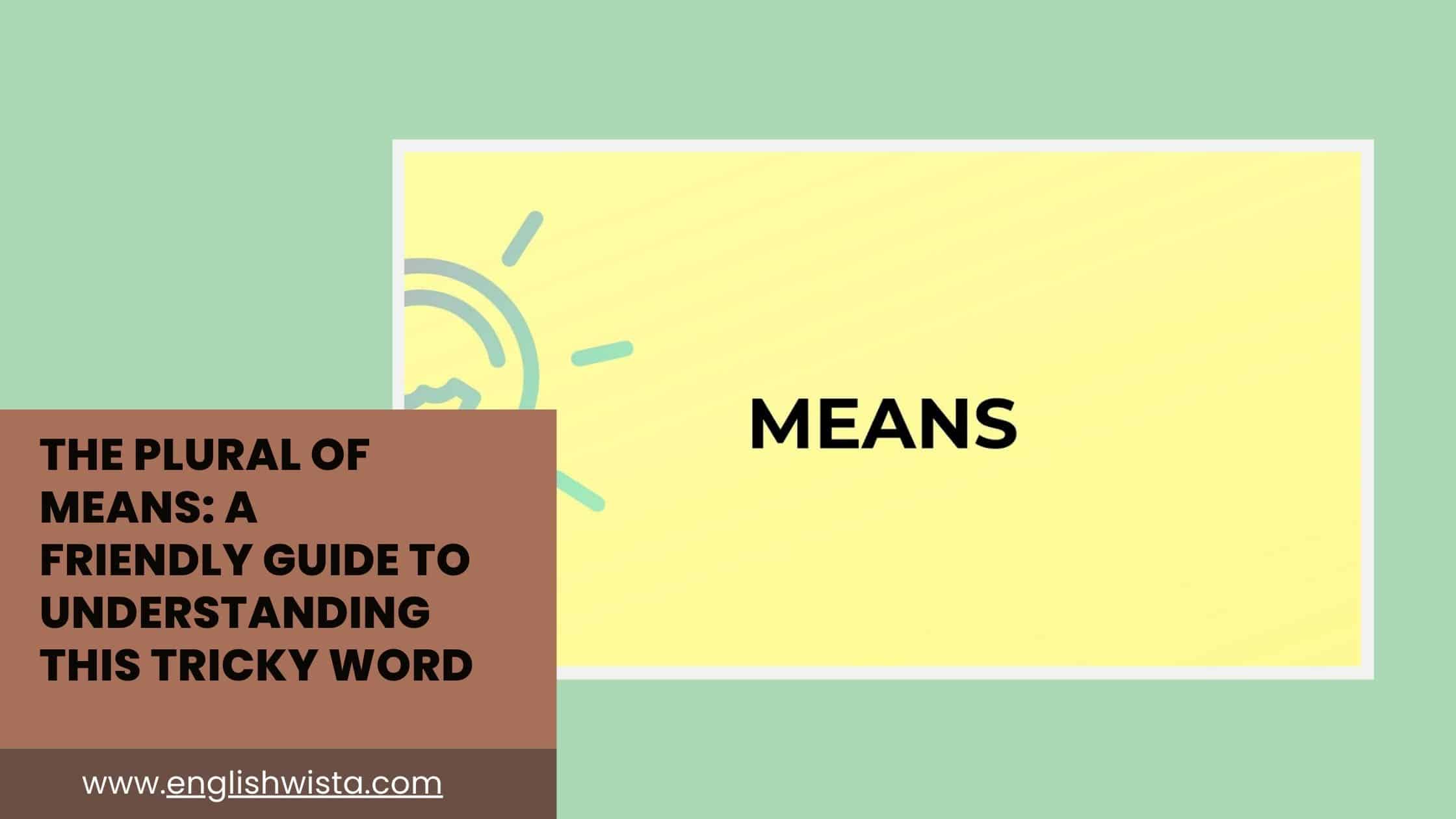Have you ever stumbled over the word means and wondered whether it’s singular, plural, or both? You’re not alone! Many people native English speakers included get confused by this little word. It looks like it should be plural, but sometimes it acts singular. And other times it stays the same whether you’re talking about one thing or many things.
In this article, we’ll explore the word means step by step. By the end, you’ll know how to use it with confidence. We’ll keep the tone light and fun, with plenty of examples to make everything clear. Whether English is your first language or your fourth, you’ll leave here saying, “Oh, that makes sense now!”
Let’s dive in.
What Does “Means” Mean?
Before we talk about plurals, let’s first understand the meaning.
The word means is a noun that refers to a method, way, or tool used to achieve something. In other words, it’s about how you get something done.
- Example: “Writing is a means of communication.”
- Example: “Exercise is a means to stay healthy.”
Here, means is about the method or the way of doing something.
It can also refer to money or resources:
- Example: “She has the means to buy a new house.”
- Example: “He doesn’t have the means to travel abroad.”
So the word can describe both methods and resources. That’s why it shows up so often in English.
Is “Means” Singular or Plural?
Here’s the part that confuses almost everyone: means can be both singular and plural.
When you’re talking about one method or one way, means is singular:
- “Hard work is a means to success.” (one way)
When you’re talking about several methods or ways, means is plural:
- “There are many means to solve this problem.” (more than one way)
Notice something? The word doesn’t change its form. Whether it’s singular or plural, it still looks the same: means.
That’s why it feels confusing because most English nouns change in the plural (like book → books, car → cars). But not this one.
How Do You Know if “Means” is Singular or Plural?
The trick is to look at the verb that follows.
- If the verb is singular, then means is singular:
- “This means is effective.”
- If the verb is plural, then means is plural:
- “Different means are available.”
So the surrounding words give you the clue.
Why Doesn’t the Word Change in the Plural?
This comes down to history and word origins. The word means comes from the Middle English and Old English word mēne, related to “that which is intended.” Over time, the form means developed as both the singular and plural.
It’s similar to other English nouns that stay the same in singular and plural, like:
- sheep (one sheep, many sheep)
- deer (one deer, many deer)
- species (one species, many species)
So, you can think of means as belonging to that “unchanging” group.
Examples in Sentences
Let’s practice seeing it in action.
Singular use of means:
- “Kindness is a means of building trust.”
- “Education is a means to a brighter future.”
Plural use of means:
- “There are several means of transportation in the city.”
- “The internet and television are common means of communication.”
Using means to talk about money/resources:
- “She lived within her means.”
- “They didn’t have the means to buy the expensive car.”
Notice how natural it looks in all these sentences.
Common Phrases with “Means”
English has a lot of fixed expressions with means. Here are some you’ll often hear:
- By no means – absolutely not.
- “It’s by no means easy.”
- By all means – certainly, of course.
- “Can I borrow your book?” “By all means!”
- Living within one’s means – spending only what you can afford.
- “He always lives within his means.”
- A means to an end – something you do not for itself, but because it leads to another result.
- “For her, studying was just a means to an end.”
These expressions make English sound richer and more colorful.
What About “Mean” Without the “s”?
Good question! The word mean without the “s” has several different meanings:
- As a verb: to signify or intend.
- “What do you mean?”
- As an adjective: unkind.
- “He was being mean to his brother.”
- As a noun (in math): average.
- “The mean of 4, 6, and 8 is 6.”
But notice: when we’re talking about methods or resources, we always use means, never mean.
So if you’re talking about “ways,” remember it’s always means.
Do Native Speakers Get Confused Too?
Absolutely! Even native speakers pause sometimes when deciding whether to treat means as singular or plural. For example, someone might say:
- “This means is effective” (sounds a bit stiff, but correct if talking about one).
- Or they might prefer: “This method is effective.”
Because of that, many people simply replace means with another word like method, way, or tool when writing or speaking casually.
Fun Facts About “Means”
Here are a few extras to keep things interesting:
- The phrase by all means dates back to the 1500s. People used it to emphasize agreement.
- The idea of means of production is famous in economics, especially in Karl Marx’s writings. It refers to the tools, factories, and resources used to make goods.
- The word means is often used in legal and formal documents because it sounds more official than “ways.”
Quick Comparison with Other Words
Let’s compare means with some similar words:
- Method – always changes form (method → methods).
- Way – also changes (way → ways).
- Means – stays the same (means → means).
So when in doubt, think: “means is like sheep.” Same word, no change.
Easy Tips to Remember
Here are some friendly reminders you can keep in mind:
- Means = method or resources.
- It can be singular or plural depending on context.
- The word itself doesn’t change form.
- Watch the verb to figure out if it’s singular or plural.
- Common phrases like “by all means” and “within one’s means” use it in set ways.
If you keep these in your mental pocket, you’ll never feel stuck again.
Conclusion
The word means can feel tricky at first because it refuses to follow the usual rules of English plurals. But once you know its secret that it stays the same whether singular or plural it becomes much less scary.
You’ve now seen how to use it to talk about methods, resources, and in common everyday phrases. You’ve also seen examples in both singular and plural forms, along with some fun facts and comparisons.
So next time you come across this word, you’ll know exactly how to handle it. By all means, use it with confidence!



